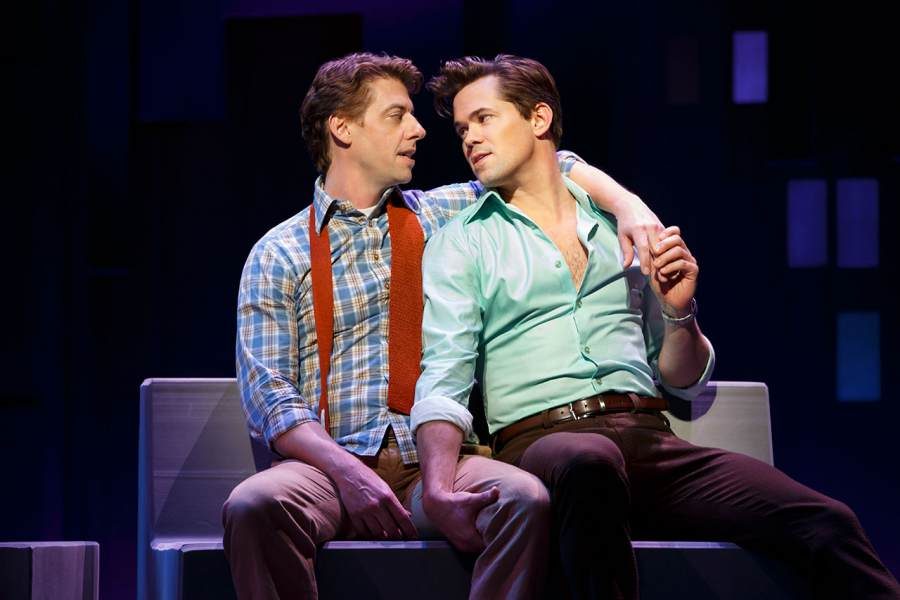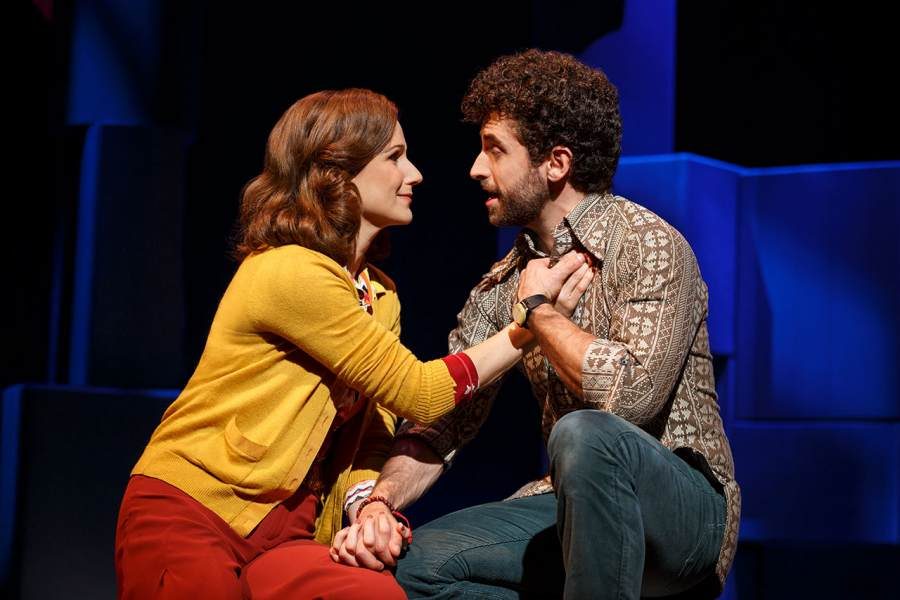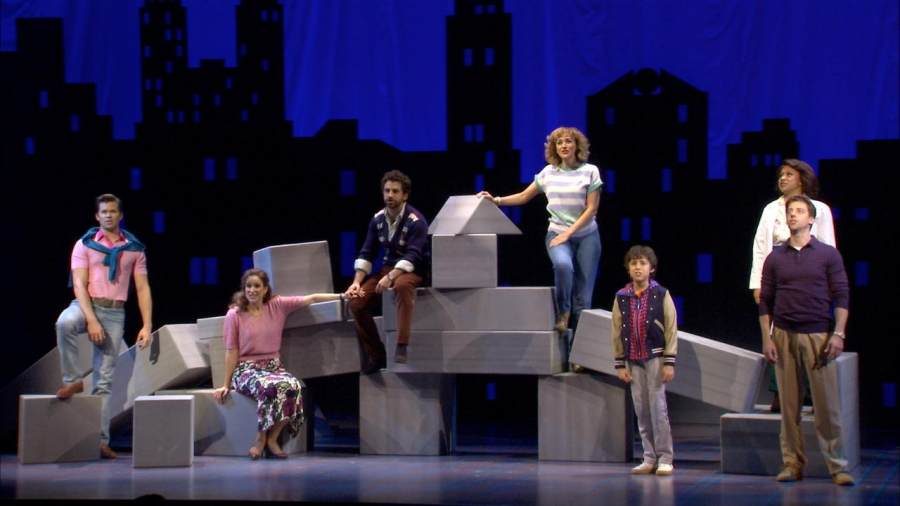

Homosexuals, women with children, and short insomniacs everywhere…. rejoice!! The long-awaited release of Falsettos, a taped broadcast of the 2016 revival, which played Broadway last September-January and was previously screened in cinemas across the country, has finally made its highly-anticipated debut on BroadwayHD. That’s right, the story which follows family patriarch Marvin as he navigates the trials and tribulations of love in all its forms, in an attempt to create a “tight-knit family” out of the eclectic array of core relationships in his life, is now available in a vibrant, hi-definition format you can watch from the comfort of your own home on your personal laptop computer. (What a world we live in!!)
Now, we know you're totally going to stream it anyway, but nonetheless, we've compiled a list of reasons we think the broadcast is definitely worth watching, covering everything from praiseworthy performances to poignant themes and blending elements of the crisp home viewing experience with elements of the impeccably revamped production itself.
It’s all ahead… and the welcome mat is on the floor. So, what are you waiting for? Let’s begin!
Opening Credits Sequence: Sure, it may seem minor (and hey, it's not like we wouldn’t be all for Broadway folk receiving their respective due anyway), but seriously... the way this whole sequence is executed is sheer genius, promoting all that is good about this phenomenal community to outstanding effect.
First, the decision to provide separate billing for each actor — alongside a sleek headshot of their face from the official poster art — rather than simply rolling them across the bottom of the screen during the feature presentation, thus distracting from the entertainment in question, allows for greater and clearer focus on the individual performers.
But then to single out some of the key major players in the creative team, especially those that far too often go unnoticed (like the orchestrator and musical director — seriously, their work with Finn’s score here is unmatched!!) not only shines a light on these unsung heroes period, but allows them greater visibility in the eyes of the general public, which, in turn increases the public’s awareness (read: those who may not be as Broadway-savvy) of who these people are, what they do, and how much work actually goes into mounting a Broadway production. A win all around!
To top it off, it’s all underscored with an upbeat medley of “Welcome to Falsettoland” and “A Day in Falsettoland”, tempting our tastebuds in the best way for the theatrical brilliance that’s about to transpire.
And it’s not taking anything away from the customary, more extensive credits sequence that comes rolling from the bottom of the screen at show’s end. But this one is singular in that, much like opening a Playbill at pre-show, it prepares us for the action to come. In viewing it, we feel ready. We know we’re in good hands. Everything will be all right. No questions asked.

His Name Is Mendel: In an evening chock-full of gut-wrenchingly dramatic performances (hello?! Christian Borle?! Andrew Rannells?! Anyone?!), it's safe to say that Brandon Uranowitz — while still very much playing a character in his own right with his fair share of moving moments — owns the majority of the show’s comic relief, and, as evidenced by the recording, it’s a title he wears oh so well. He's in full form as quirky psychiatrist Mendel, injecting the character with a unique flashy flamboyance that combines his own unique brand of Brandon (spot-on comic timing, vocal intonation, and the like) with the cavalcade of Mendel's already-established eccentricities...and the result is near-perfection; from his unconventional rock star moves during his therapy session with Jason (Anthony Rosenthal) to his hilariously disastrous execution of a somersault (and don’t forget his ROFL bit with a pair of air traffic controller’s wands!), it’s clear he revels in putting his own stamp on the role… and we just can’t get enough. We’d have absolutely no problem returning next Friday (or any other day of the week honestly). Yes, Mendel, we admit we admire you.
“I’m Breaking Down”: Okay, so on the note of comedic moments, how could we NOT include this feat of theatrical comic genius on our list of Falsettos faves?! Now a staple on the setlist of the supreme SJB, since reprised at CD signings, Feinstein's/54 Below concerts and — hello?! — the 2017 Drama Desk Awards, this gut-busting showstopper brilliantly displays all the hysteria surrounding Trina’s gradual descent into madness that we’ve come to know and love — from the pageant waves to the crying spells to that one-of-a-kind banana bris -- and the cameras capture it all with aplomb. Simply put: as evidenced by this recording (and its aforementioned appearances in concerts beyond just this revival), the show may have shuttered eight months ago… but for Block and her now-signature song, the journey’s only just getting started.
Inventive Staging: In addition to the superb performances, James Lapine’s deft directorial skill also deserves its fair share of praise. Though the first act ultimately ends without Marvin receiving the tight-knit family he had hoped for, the staging doesn’t shy away from exhibiting the closeness of this group. All remain onstage throughout the duration of the act, lending background vocals or choreography to certain numbers, narrating scenes in which they don’t physically appear, or, most notably, simply watching the action (though they do react in character, which, while it doesn’t help this argument, is a brilliant choice in itself!), while taking apart a cube of plush building blocks to create each individual set piece, chair, or entranceway needed within a given scene.
On the whole, it creates an interesting dichotomy between the players and the characters; the cast is so “tight-knit”, to use Marvin’s word, while, in contrast, the people they portray are falling apart at the seams, and to have that distinction depicted literally back-to-back is mind-blowingly effective.
Of course, this teamwork aspect starts to deteriorate, naturally, once we enter the second act, and relationships become more personal, the conversations become more isolated, the scenes take place in larger, broader locations, and the outcome of each scene is more uncertain. But ever the master, Lapine brings it all back in the end — the cube of building blocks returns, and they pull one out and use it for Whizzer’s gravestone.
That way, when they leave the stage, the set returns to what it was, and the cube (like the family) is back intact — but with one piece glaringly missing. As the lights dim, the remaining cast members huddle together, united as one, as a spotlight shines on the gravestone, highlighting the missing member. Marvin got his wish. They’re a “tight-knit family.” And they march along. #GoodChoices #BravoLapine

Love Is Love Is Love Is Love: Well, the situation’s this. As mentioned, the show does a number on the trial and tribulations of love, exploring the relationships between ex-lovers, new lovers, same-sex lovers, fathers and sons, fathers and stepfathers, and all the break-ups, make-ups and frenzied goings-on in between. But here’s the catch. Even with all its foibles and flaws, the overarching message that permeates throughout the show is that love conquers all. Despite the many (many) fights that ensue at the top of the show, and enduring Whizzer’s blunt declaration that “he never wanted to love him," Marvin genuinely asks at the end of the show, “What would I do if you had not been my friend?” Break-ups have nothing on these two, who start bickering over petty differences and shouting “This [relationship] had better come to an end," but end tearfully express their love for one another upon hearing of Whizzer’s fatal diagnosis. With all they’ve been through, their love endures.
Furthermore, Trina and Mendel express love in their own way, which also grows stronger throughout the show; the constant repeat of “Everything will be all right,” even in the face of grave uncertainty, shows their willing ability to protect one another, calm each other, and make each other feel safe. Their love endures, despite the hoops they’ve jumped through (read: Marvin) to get there.
And again, despite the ups and downs of all the action in the show, and the hardships faced within each of the individual relationships, the lights dim on the entire family in a group hug. Nothing else matters, and they’re there for each other no matter what.
“Lovers come and lovers go,” they sing at the top of Act II. Perhaps in life or another show, yes, but in this case, they’ve got it wrong. In Falsettoland, love (and lovers) are here to stay. And it’s a beautiful thing.